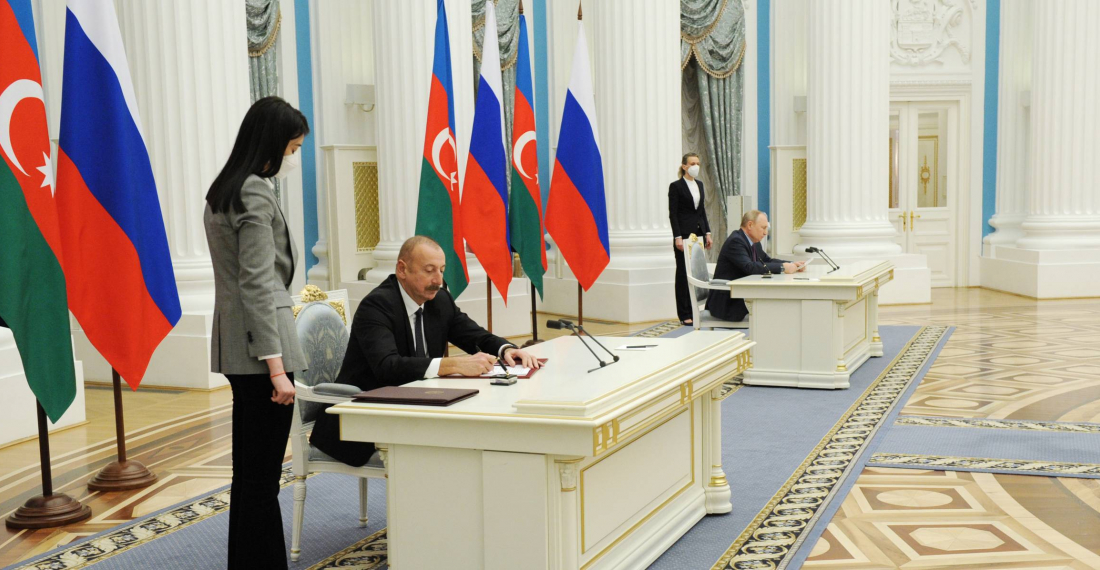On February 22, the President of Azerbaijan Ilham Aliyev made an paid official trip visit to Moscow to discuss and sign a new declaration on allied cooperation with Russia. The visit came just a day after President Putin's infamous decision to recognize the independence of the so-called Donetsk People's Republic and Luhansk Peoples' Republic in Eastern Ukraine. President Vladimir Putin’s “unexpected” decision deteriorated relations with Ukraine, even more and was followed by the new round of economic sanctions imposed by the U.S and the EU.
President Aliyev's visit to Moscow triggered debates in Azerbaijan and Russia, respectively , on whether the main text of the declaration was pre-negotiated between the two leaders, or prepared amid the escalation around Ukraine. Obviously , the signing of the an allied cooperation declaration with Russia should not come as a surprise since official Baku has long been maneuvering between Moscow and the West as much as it is possible to preserve its own “red lines” in terms of national interests.
The declaration on allied cooperation entails strengthening cooperation on regional and international security with the aim of protecting the interests of Azerbaijan and Russia and refers to the treaty on mutual cooperation on security and friendship signed in 1997 and the declaration of strategic cooperation signed in 2008. Also, the new document encompasses cooperation on in a large spectrum of fields, including regional security, military cooperation, energy, economic, agriculture, and mutual consultations on joint efforts within international organizations and so on. The main body of the declaration suggests that Azerbaijan does not take any additional or significant obligations as an ally but reassures Russia of Baku's friendly attitude toward Russia . The new document is likely calculated to ensure a distance in Azerbaijan’s engagement with the West.
The significance of the bilateral energy partnership with the EU rose dramatically amid Russia-Ukraine escalation in the last several months. The escalation heightened, with Moscow openly threatening the EU countries with natural gas cut-off, which also shed light on Europe's energy vulnerability and dependence on Russian energy exports. In this context, the EU expressed its interests in increasing gas imports from alternative suppliers like Qatar, Norway, Azerbaijan. Azerbaijan has long been a key partner in the West, particularly in the energy field, given its rich hydrocarbon resources and access to the Caspian basin. Although Azerbaijan does not possess substantial natural gas reserves, it is still capable of contributing to the strengthening of energy security of the Southern European region.
Ironically, Ukraine's escalation with Russia the Ukraine-Russia crisis boosts Azerbaijan's image as a reliable partner for the EU. However, there is no doubt that Moscow watches the Azerbaijan – EU dialogue cautiously, and eyes guarantees that Baku’s strategic partnership with the EU does not contradict its own geopolitical interests. Hence, the current declaration on allied cooperation could be seen as a written guarantee for Azerbaijan’s future neutrality, though the latter has never been a part of the Western-sponsored anti-Russian sanctions. Also, it seems that with the new document, Azerbaijan's membership issue in the Collective Security Treaty Organization (CSTO) has been put aside.
Moreover, during the joint press conference of both leaders in Moscow, President Aliyev emphasized the point regarding “parties’ mutual respect to territorial sovereignty and integrity of each other, non-interference into domestic affairs.” Also, Aliyev repeatedly reaffirmed its stance on the illegal armed groups stationed in the Karabakh region, the necessity to withdraw all of them, and unblock regional communication lines. This confirms that despite deepening dialogue and cooperation with Moscow, Baku sets its own red-lines regarding its national interests and regional security by putting the emphasis on certain nuances it considers a top priority.
In this vein, it is also possible that with the signing of the new declaration, Baku may soon get some concessions from Moscow regarding the resolution of the Karabakh resolution issue, or on the regulation of the Russian peace forces deployed in the region and lacks that still lack of a clear mandate. Although official Baku has already secured a solid regional security partnership with its natural ally – Turkey, by signing the Shusha declaration in 2021, it still eyes strong Russian engagement for reaching a final peace agreement in the Karabakh conflict.






